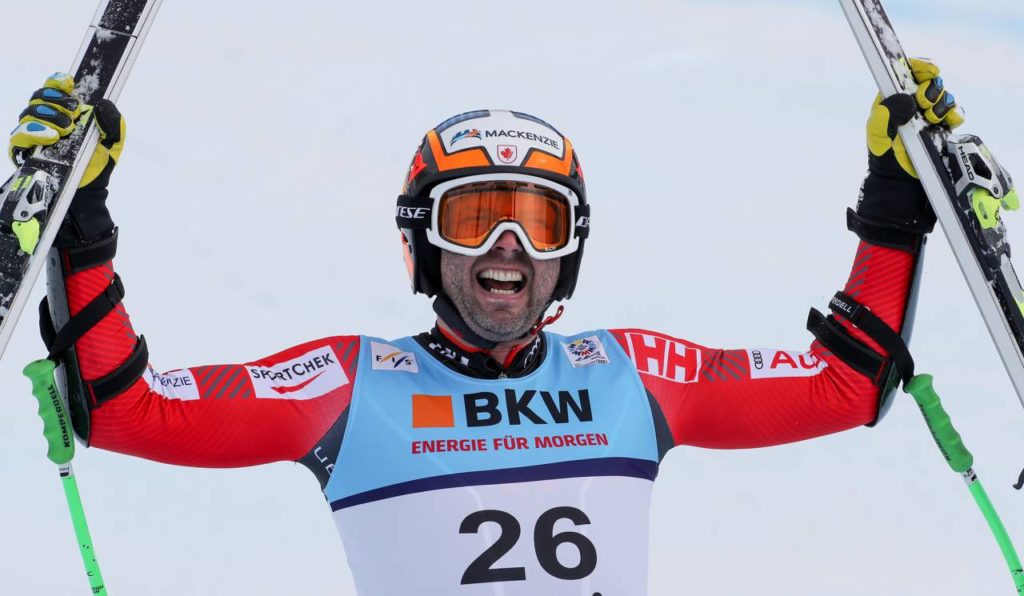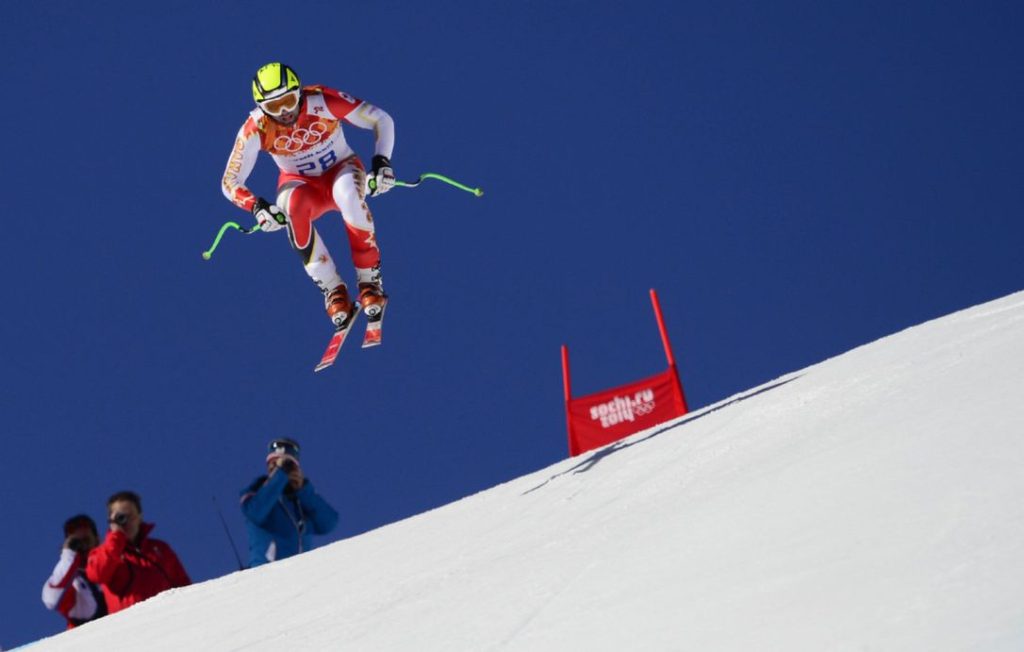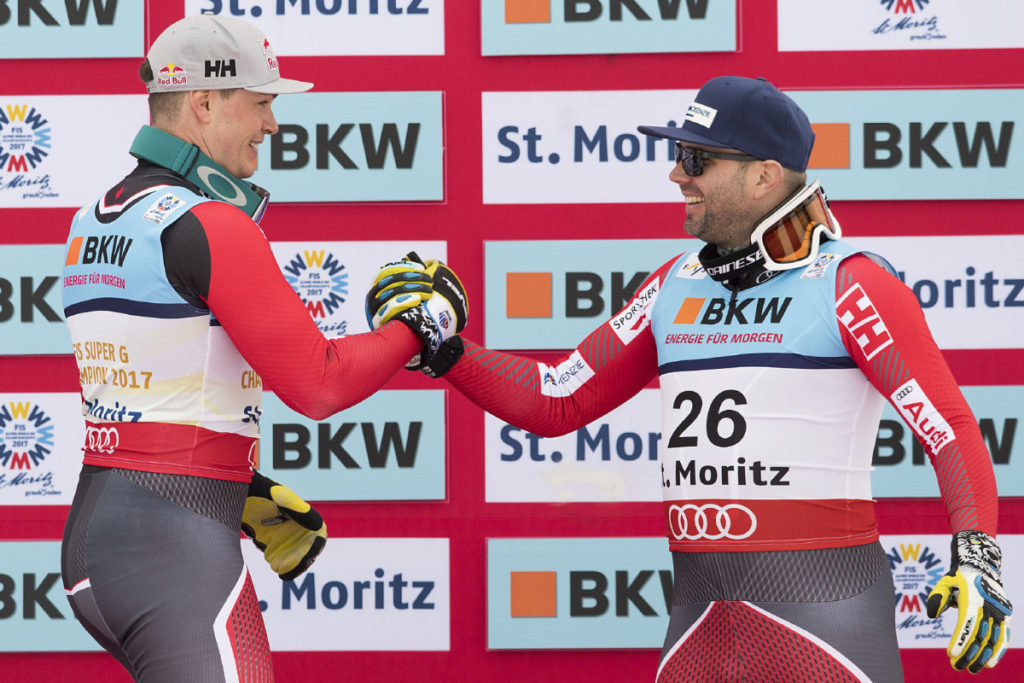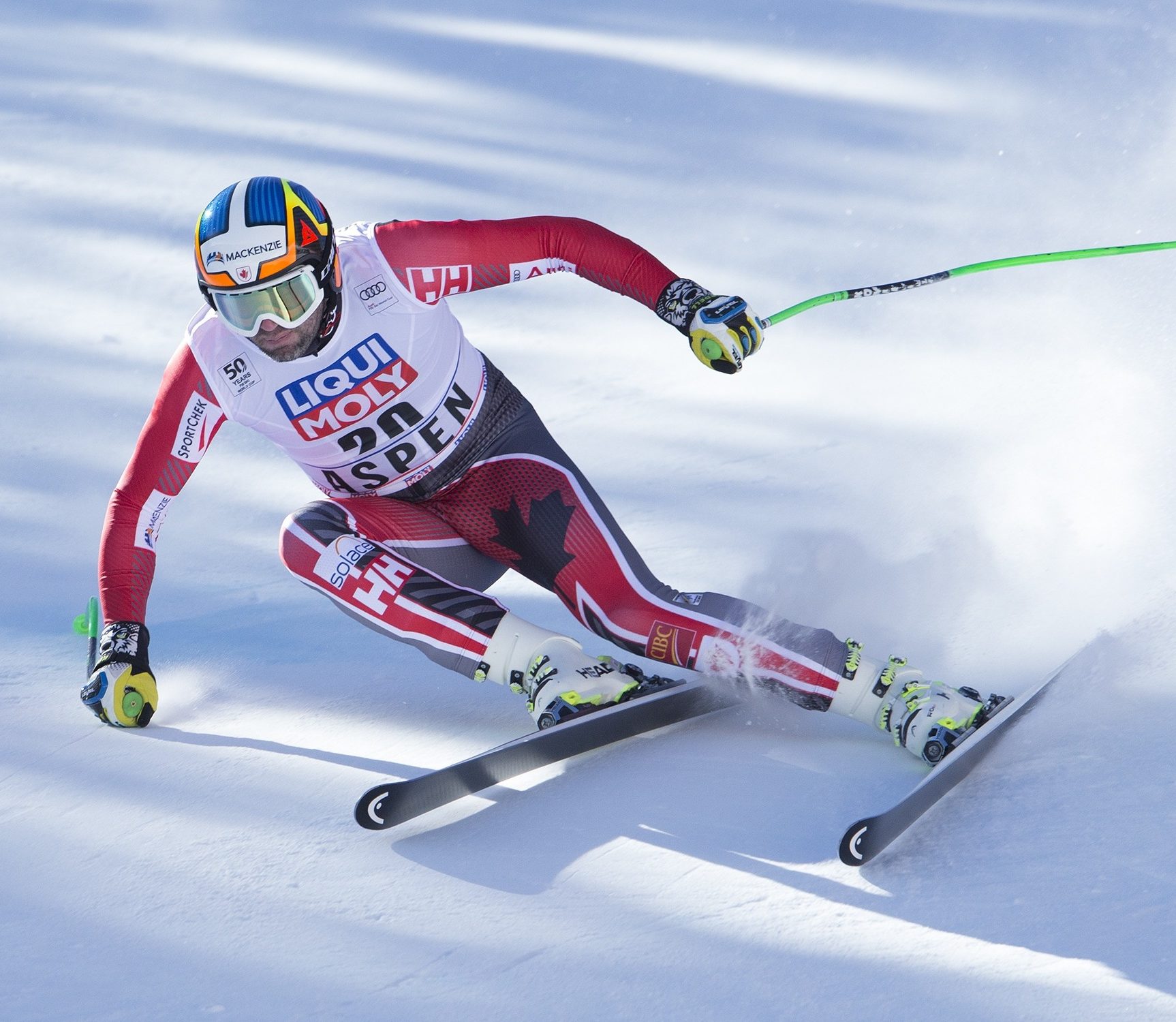Imagine the last time you were driving on the highway just minding your own business. Sure, the speed limit is 100 km/h but the flow of traffic is higher. Now consider the safety of the vehicle you’re in. It weighs a few tons. It’s been crash-tested and is filled with forward collision avoidance and lane departure warnings.
Now picture removing all of those supports. Gone is the windshield, the flat, paved road and your brakes. And let’s put you at the top of a specifically-designed track. It’s literally a sheet of ice that is angled at 90 degrees in sections. To be clear, that’s a free-fall. Straight down. But don’t worry, you’re flying well over 140 km/h wearing a tissue-thick body suit.
Elite athletes push themselves and their equipment to the edge on a daily basis (and love every minute of it!). With ski season about to start, In Partnership With wanted to explore what this elite sport experience can teach us about gaining a new edge in our own businesses. For that, we reached out to four-time Olympic downhill racer Manny Osborne-Paradis. Enjoying newfound time with his growing family, he reflects on what he’s learned following his recent retirement from the World Cup circuit as he finishes up his business degree.

A Constant Focus to Be Better
As Manny reported to the CBC this fall:
There’s no boundaries. There’s dead ends, blockades and things that are tougher than others. They taught me persistence, grit and kindness go a long way to building up people around you, not just yourself.
These are the themes that will continue with him for his next adventure in life as he joins the business world.
Following a horrific crash in 2018 that saw his leg severely broken, Manny remains resilient and optimistic about the future. While contemplating his return to the sport in 2020, he has decided to leave on his own terms. He’s content with that. It tops off an incredible string of successes. Four Olympics, three World Cup wins and 11 podiums during his ski racing career. Plus, he is the first Canadian to win both a World Cup Downhill and a World Cup Super G.
Making the Most of Winter by Adapting
Manny plans on skiing a lot this winter and he’s excited about that. He says it’s going to be great to spend more time with his wife and two kids. Of course, like everything this year, there’s going to be logistical challenges. But Manny is optimistic we can learn from our past and learn from the Europeans.
What he experienced there – even during normal times – is that Alpine resorts keep everyone outside to get their boots on (often in the parking lot). Lodges and restaurants only want skiers in there if they’re buying food or drinks. While different than the more comfortable North American standard, there’s benefits. As proof, you don’t waste 45 minutes in the lodge to sit down and put your boots on. You just put your boots on and get skiing faster. And who doesn’t love that!?
Manny thinks Canadians will figure it out and that there’s been some luxuries that that we’ll have to give up. All in all, it’s worth it to keep the ski hills open. The worst thing that could happen is that we miss a season on snow. That’s bad for business, for physical and mental health and for the development of athletes.
Ski Racing Career Highlights
As with anyone, there’s the professional aspect and the personal aspect. When Manny considers the professional side of his 13-year racing career, his win at Val Gardena, Italy, his second career podium in Val d’Isere, France, and his world championship medal are all highlights. It’s an impressive showing that any athlete would be proud of.
On the personal side, the highlight of Manny’s ski racing career are the people that he’s met.
It’s something he’s passionate about and appreciates what he got to see in the world. Manny observes that the problems of the world most often involve people. People judging others by their backgrounds and people being different from each other. With his globe-circling perspective, Manny is adamant. We are all so much the same, even if we come from a different background or culture.
A Diverse Ski Racing Community
Manny recalls from Canadian Ski Team racers in the 1980s that they struggled to connect when English wasn’t as prevalent. A lack of common language created friction between national teams. There was the perception that the Austrians were so mean or the Italians were always seeking attention. Of course, none of this was true but it seemed real. Nobody understood each other and there was no means or interest in finding common ground.
Fortunately, English speaking by the teams took off and has now connected all the racers. Today, it’s one big happy family that tours around and everybody’s friends with everybody. There’s certainly different personalities on the circuit but Manny has friends at every World Cup race, including with athletes, physios and coaches.
What he loves about it is that there’s so many backgrounds. Whether from small towns or cities or different countries, you see everybody’s truly the same. People want to have fun. They are inspired. Their work ethic is very similar. How they interact with their friends is the same, as is what they find to be exciting.
Manny finds that the true value in his ski racing career, and life more generally, has been to see how similar people are.
It has been rewarding for him to recognize the one thing that skiers have that brings them together is the love for mountains, snow sports and skiing. It doesn’t matter if you’re an old timer from from Italy or if you’re a multimillionaire business leader from Hong Kong. It’s clear that they all have a common bond that brings them together to succeed.

Giving Back With Right To Play
For nearly eight years, Manny has been a Right To Play athlete ambassador. Supporting Right To Play is important to Manny since there’s a lot of “take” in sport – and athletes need people to “give” for them to be successful – but it was important for Manny to give back, too.
Right To Play operates in 15 countries around the world to educate, empower and protect girls and boys by allowing them to be successful in their own learning and development while preparing them for their future.
The organization believes in a future for every child driven by opportunity, empowerment and possibility. Right To Play was founded by Johann Olav Koss, a Norwegian speed skater who won four Olympic medals in two Games. The impetus for the organization was when Johann led a humanitarian trip to the newly-formed African country of Eritrea in 1994 to bring sports equipment to support the war-torn country’s youth. It was the start of an important program that enables 2.3 million children a year to rise up through the power of play.

The Power and Hope of Sport
Manny’s involvement started through working with his friends and one of his sponsors at the time.
He believes Right To Play is such a great charity because of their unbelievably important mandate to empower children in difficult situations.
To support this worthy cause, Manny hosted fundraising events with his sponsors, built sponsor donation matching via the performance prize money that he received and has hosted ski days with children in Canada. Manny reflects that it is a partnership and it is a great way to increase exposure for the organization and to support what they’re doing in the world.
The Right To Play organization is so empowering and impactful, as witnessed by Manny. He has met so many incredible donors from around the world, including at a fundraising dinner in Hong Kong. He’s also attended fundraisers in Switzerland during the race circuit and closer to home, across Canada. Manny appreciates that the Right To Play organization is international and it’s such a powerful organization to engage in marginalized communities globally. In our own backyard, Manny welcomes that Indigenous children in Canada are also recipients of this positive programming to find solutions to community issues locally.
Parallel Tracks from Skiing to Business
Manny understands that there’s no secret sauce to success. With sport (and often in business), it’s a success that is so defined. There’s one common goal and it’s a finite goal. It’s a micro goal of reaching the podium and there’s so many integral pieces that have to come together perfectly. Manny credits his support staff – from the coaches when he was three years old – all the way up to being successful.
The difference between attaining the World Cup level or someone who made the provincial team is small.
In fact, it’s a difference that you really can’t even put your finger on. Everybody works hard and tries hard. Manny believes that the key piece is that it’s effort, it’s self growth and self analyzing. It’s not being too critical of yourself. And it’s being a leader within your team, via your coaches or with others. You always have to be a leader and an advocate for yourself. The people that Manny sees as being the most successful are the people that really lived those attributes. The people who did better, Manny envies them. For the people who didn’t have the leadership skills or didn’t have the benefit of support around them when needed, he feels for them. Manny reflects that we’re all given chances to build structure and to build inspiration for others to follow along in our journey to better the people around us.

Manny notes that some athletes develop in a system and can join a national team whereby they inherit structures of support. Sometimes, athletes need to build in additional resources to the team to fill the gaps that exist. This could include bigger budgets, better training opportunities, or broader support structures. With Red Bull supporting Eric Guay on the Canadian team or Lindsey Vonn on the American circuit, that fills a lot of the gaps. For any athlete, there’s always gaps to fill and you have to build support to build a team around you to get the chance to be the best in the world. Or to be the best at anything, really.
You’re not going to go at it alone. Really, it’s more about the team that you build and less about your skill.
A Team-Based Approach to Success
Manny has seen that the one thing that’s interesting with sport is you need to lean on people even more than usual in everyday life. Often, ski racers enter the World Cup as a teenager or in their early 20s and a lot of the best racers have family who help mentor them and rally around them. Look at Mikaela Shiffrin, the American skier who is smashing records in every season she competes. Mikaela has her mom out there on the circuit with her. Marcel Hirscher, the Austrian technical skiier, had his father with him constantly. Hannes Reichelt has his father-in-law. Aksel Lund Svindal had his dad. The list goes on and on of people who had advocates for them to push for their best interest.
You really need that personal support system because any national ski team team is going to advocate for the team’s best interest.
What Manny understood during his racing career was that you need an advocate for yourself – and you can only advocate for yourself so much since you’re busy.
Manny thinks it takes a wiser, more experienced athlete to understand that. That required support is a gift that’s given prior to you really knowing that you need it.
Loyalty Is Everything
As a result of receiving this gift throughout his career, Manny says that one of the bigger things he’s learned (sometimes the hard way) is that it’s critical to be loyal to people. With business, even the sports business, leaders invite you in and they can let you go. If you’re not the flavour of the month or you haven’t scored enough goals lately or you just don’t ski fast enough, your job’s done. There’s little you can do about that.
But the people within the business, they’ve fought hard for you. And you’ve worked for them – so you have a good relationship – but no matter where you go in life, being loyal to those people is more important than anything. We can all certainly relate to this in the business world.
There’s safety in loyal networks as we move through life at a fast pace. Our supporters are likely the equivalent of airbags, seat belts and the rest that ensure we arrive at our destinations in one piece. Even if we are going way over the speed limit.
In Partnership With
Manny Osborne-Paradis is a four-time Olympic downhill racer, a World Championship Bronze Medallist and a three time World Cup winner with 11 podiums during his ski racing career. He is the first Canadian to win both a World Cup Downhill and a World Cup Super G. As a Right To Play athlete ambassador for nearly eight years, he spreads awareness, unleashes hope and inspires millions of supporters and children to rise. Off the slopes, you can find Manny hanging with his family and completing his business degree.
Tim Bishop, CM is a multi-disciplined executive with a proven record of optimizing strategic efforts to expand the influence of leading organizations, such as the Canadian Marketing Association, Cineplex Entertainment, Lavalife.com, IMI International and Northstar Research Partners. In Partnership With is his latest focus to curate Canadian marketing experts to celebrate the power of strategic partnerships in a perspective-based content series.

